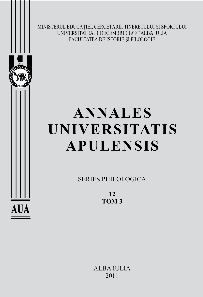T.S. Eliot. Sensul istoric al culturii
T.S.Eliot The Historical Meaning of Culture
Author(s): Anamaria BlănaruSubject(s): Literary Texts
Published by: Universitatea »1 Decembrie 1918« Alba Iulia
Keywords: historical sense; influence; universal/individual; integration; hierarchy.
Summary/Abstract: The intersection between tradition and modernity on one hand, and the problem of influence and the individual talent on the other hand, are the main issues in discussing the way the past influences the present. In Eliot’s well known essay, “Tradition and the Individual Talent”, the critic believes that one should admit that the mind of Europe is much more important than his own private mind. In his essay “What is classic” he offers another view of the dichotomy original writing-universal writing by considering literature as a reflection of the society in which its author lives. The issue of the consciousness of history sustains Eliot’s beliefs that the poet’s mind must be integrated in the universal one. According to Eliot, tradition must be integrated in every new system of thinking, and that it is not resumed as a chronological period, but as a synchronic process of creating considering the past in the present. The “historical sense” involves both meanings of tradition, the heritage from the past, and the absorption of it by the contemporary system of thinking. If the entire literature of Europe must have a simultaneous existence the author does not have the liberty to change this perspective according to his principles. Harold Bloom explains the process of homogeneity or heterogeneity between different authors by using latin terminology in order to explain different variation of influence: tessera, askesis, kenosis. In Eliot’s perspective the reader can remark that tradition and modernism are not two distinctive periods of creation; they are regarded as “organic wholes”, as systems. The “objective correlative” was an important criteria in approaching others writers who, in Eliot’s vision, succeeded or not in the process of the modernization of the poetry. Bloom compares two ways of regarding the ancestors, the British way and the American way, which contradicts one another; and it is curious to see that Eliot belongs to both perspectives and he must find a certain cohesion between them. One could discuss these issues considering the absence of influence too and how the deficiency of a hierarchy of one nation could affect the historical sense. The example discussed by many critics is the problem of Irish identity. The absence of a historical heritage was caused by the absence of a clear language system which is the first element of the individuality of one’s nation. Considering the disintegration of communication through this absence, one easily can remark that the authors themselves could not form a literary identity as long as they didn’t have the primary element: a national language and a national culture. Therefore, the anxiety of influence should develop the problem of the absence of influence, of the impossibility to create a work of art in the whole vision of the historical sense.
Journal: Annales Universitatis Apulensis. Series Philologica
- Issue Year: 12/2011
- Issue No: 3
- Page Range: 25-32
- Page Count: 7
- Language: Romanian

